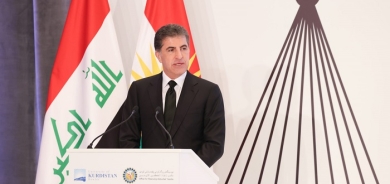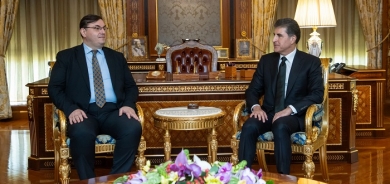Former CIA director calls for more action in combating ISIS

WASHINGTON — Testifying before the US Senate Armed Services Committee, former CIA Director and General David Petraeus laid down his vision to counter the Islamic State in Iraq and Syria, and called for an increased US military presence in order to defeat the Islamist group, but advised against allowing Kurdish forces to enter into Sunni-Arab dominated areas to fight the militants.
"An impressive coalition has been assembled, key ISIS leaders have been killed or captured and support for local forces in Iraq and Syria has helped roll back ISIS in certain areas," he said. "Some elements of the right strategy are in place, but several are under resourced, while others are missing. We are not where we should be at this point."
“In my judgment, increased support for the Iraqi security forces, Sunni tribal forces and Kurdish Peshmerga is needed, including embedding US adviser elements to the brigade headquarters level of those Iraqi forces fighting ISIS,” he added.
The retired general, who is credited for his role in the 2007 Iraq surge that reduced violence in the country by over 90 percent, said that he would not make recommendations lightly, and “inaction can also carry profound risks and costs for our national security."
Petraeus asked for including the Sunni Arabs as an indigenous force to combat ISIS, shored up by US support and for them to be protected from ISIS and the Bashar al-Assad regime in Syria in order to build confidence with them.
“The central problem in Syria is that Sunni Arabs will not be willing partners against the Islamic State unless we commit to protect them and the broader Syrian population against all enemies, not just ISIS,” he said. “That means protecting them from the unrestricted warfare being waged against them by Bashar al-Assad, especially by his air force and its use of barrel bombs.”
“You can't push Kurds there or in Iraq farther than the areas that they can hold with legitimacy so you can't push them all the way,” he continued.
Petraeus said that Kurdish officials are also aware that sending Kurdish forces could backfire, and that's why they have been reluctant to move into areas “that are not their traditional territory.”
In the testimony, he advocated the formation of safe enclaves, protected by coalition air power inside Syria to protect civilians and the relocation of refugees.
He also cautioned about US actions that could lead to the toppling of Assad without knowing what might follow, describing Syria as a “geopolitical Chernobyl” that will impact the entire neighborhood for decades to come.
Commenting on breaking up Iraq and Syria, Petraeus ruled out that there will be an amicable divorce between Sunnis, Kurds and Shiites, saying that the territorial integrity of Iraq can still be saved, but it has to be on a different political devolution of power between Sunnis, Kurds and Baghdad.
“The Sunnis desperately need it because without this they have no source of revenue for those who say let Iraq break up. By the way, it's one thing for Kurdistan, which is largely autonomous now and has pretty good oil revenues coming in, although not enough. They are running a deficit and they still need what they can get from their 17 percent out of the oil revenues from Iraq,” Petraeus told the lawmakers.
However, he admitted that the ultimate solution for Syria could be a break up, because it has gone through several stages, including ethnic cleansing, which has provided grounds for its fragmentation into three or four countries.
“This would not have been a solution for Syria four years ago. But we are where we are now for Syria,” Petraeus said. “You see enormous displacement of different sects.”
Rudaw















